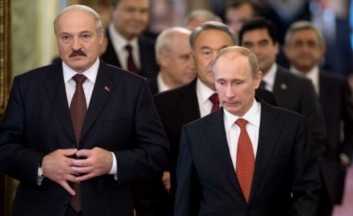Moscow not interested in long-term guarantees for Lukashenko
 The situation has not changed
The situation has not changed

President Lukashenko’s efforts were in vain – the Kremlin has neither supported his (and the Kazakh President’s) proposal to create a single energy market, nor to abolish oil duty exemptions. Belarus has been prompted to start bilateral negations with Russia on oil supplies, putting her economic, foreign policy, and military independence at further risk. With each new stage, Eurasian integration fails to bring any financial benefits for Belarus, the costs only rise.
On April 29th, Minsk hosted the Supreme Eurasian Economic Council meeting, which gathered presidents of Belarus, Russia and Kazakhstan.
The SEEC Summit in Minsk was the last decisive trilateral meeting, during which the presidential ‘troika’ was anticipating to close all controversial issues before signing the Eurasian Economic Community’s founding treaty in Astana on May 29th. The Eurasian Economic Community’s founding treaty is scheduled to take effect on January 1st, 2015. However, during the Summit, the allies could not agree on oil duty exemptions, the most sensitive issue for Belarus.
If exempt from paying oil duties, Belarus would earn additional USD 3-4 bln. The Belarusian government could use this money to minimise risks during the 2015 presidential campaign, amid reduced social guarantees for the population.
Nevertheless, the Summit participants have agreed that the existing restrictions on trade in oil and oil products between the Customs Union countries will remain until 2025. President Lukashenko, however, using strong language, has repeatedly underscored the critical importance of abolishing oil duty exemptions and trade restrictions for Minsk. He even challenged the need to establish the EEC in the near future: “It seems to me that we should raise the issue of the Eurasian Economic Union in ten years, if we are not ready now”.
Statements by Belarus’ president had no effect on the Kremlin as regards establishing a common market for energy products. Moscow has no interest in providing long-term guarantees to Lukashenko. He could not even achieve a compromise, i.e. to reduce export duties on oil products to the Kazakh level from almost USD 400 per tonne in Russia to USD 80 in Kazakhstan.
Belarus still has a slim chance of notching a point on oil duty issues. Viktor Khristenko, Chairman of the Board of the Eurasian Economic Commission, emphasised that the issue of export duty on petroleum products was “the subject of bilateral agreements and until after a common market is created, will continue to be the subject of bilateral settlement”. Meanwhile, the Kremlin might consider some targeted compensations to Minsk.
When the time comes, the Belarusian government will sign the EEC founding treaty in a timely manner and on the Kremlin’s terms. Moscow reserves the right to control Minsk’s foreign policy by providing ‘hands-on’ support to Belarus, i.e. in small doses at the last moment.
Subscribe to our newsletter




Situation in Belarus
Constitutional referendum: main consequences


 Video
Video
How to count the political prisoners: are the new criteria needed?


 Video
Video
Paternalism In Decline, Belarusian Euroscepticism, And The Influence Of Russia


 Video
Video












